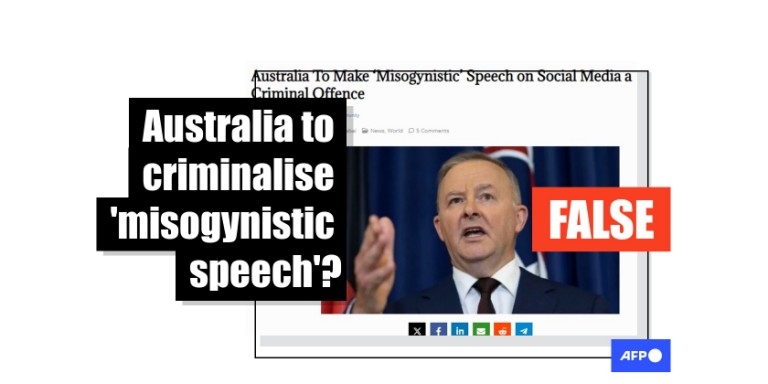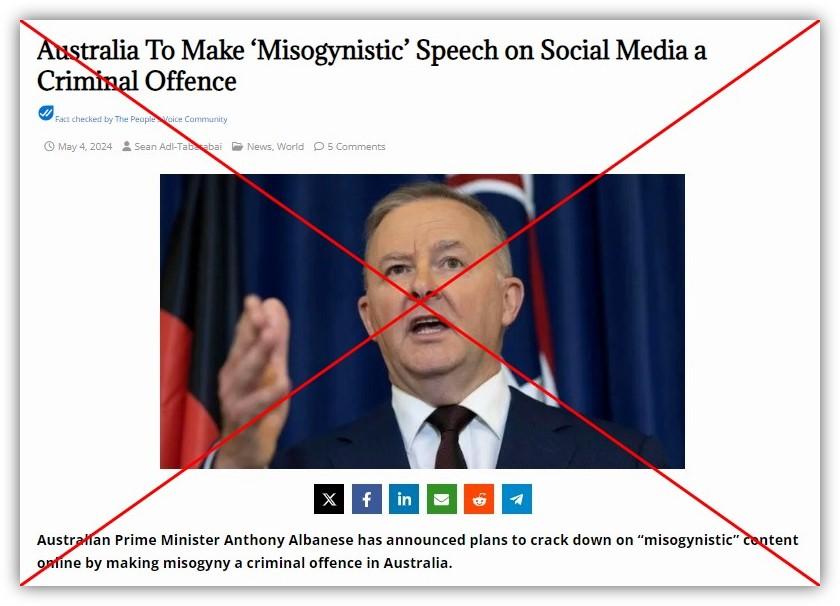
Australia plans to criminalise non-consensual deepfake pornography, not 'misogynistic speech'
- This article is more than one year old.
- Published on June 21, 2024 at 11:07
- 3 min read
- By Joseph OLBRYCHT PALMER, AFP Australia
"Australia To Make 'Misogynistic' Speech on Social Media a Criminal Offence", reads the headline of an article published by The People's Voice on May 4, 2024.
AFP has fact-checked the website, which was formerly known as News Punch, multiple times for sharing false or misleading claims.
The opening line of the article states: "Australian Prime Minister Anthony Albanese has announced plans to crack down on 'misogynistic' content online by making misogyny a criminal offence in Australia."
It was published after the Australian media reported that the Albanese government would introduce legislation to outlaw deepfake pornography as part of wider efforts to combat violence against women and a rising trend of digitally created sexualised imagery targeting women of all ages (archived links here and here).

The article was shared by Australia-based Facebook users in groups with thousands of members here and here, as well as on social media platform X here.
It was also shared by users based in the United States and the United Kingdom, with the UK-based user asking if Australia was "becoming a feminist dictatorship where freedom of speech will be banned?"
But the Albanese government did not say it was planning to make "misogynistic speech" a criminal offence.
Proposed legislation
An Australian government press release announcing the steps that would be taken to tackle violence against women, misogyny and harmful online content only mentions two pieces of proposed legislation: one to ban the creation and non-consensual distribution of deepfake pornography, and another that will outlaw the release of private information online with an intent to cause harm -- also known as "doxxing" (archived link).
In the press release, Attorney-General Mark Dreyfus is quoted as saying: "These reforms will make clear that those who seek to abuse or degrade women through doxxing, deepfakes, or by abusing their privacy online, will be subject to serious criminal penalties."
Dreyfus introduced the legislation to the House of Representatives on June 5; if passed, people convicted of sharing such material could be jailed for six years, while those convicted of creating it could get seven years (archived link).
The press release also said the government would start a new phase of its Stop it at the Start campaign, which aims to counter the "corrosive influence of online content targeted at young adults that condones violence against women" (archived link).
It said the campaign will raise awareness about the proliferation of misogynistic influencers and content, and encourage conversations within families about the damaging impact of the material. It does not say these influencers will be prosecuted or that the content will be criminalised.
Jeannie Paterson, professor of law at Melbourne University, told AFP on June 20 the amendments "do not criminalise misogynistic speech".
Paterson, a co-director of the university's Centre for AI and Digital Ethics, said: "The amendments will explicitly make it an offence to use a carriage service for the non-consensual sharing of sexual material, including sexual material that depicts a real person created using technology."
Asher Flynn, an associate professor of criminology at Monash University, also told AFP on June 20 the legislation is "targeted at a rapidly developing form of harm that is often gendered in nature."
Flynn, a leading researcher in AI-facilitated abuse, said the legislation was "a positive step as it sends a clear message that Australia does not condone this behaviour and that we take the non-consensual creation and distribution of deepfake sexualised material seriously".
Copyright © AFP 2017-2026. Any commercial use of this content requires a subscription. Click here to find out more.
Is there content that you would like AFP to fact-check? Get in touch.
Contact us
